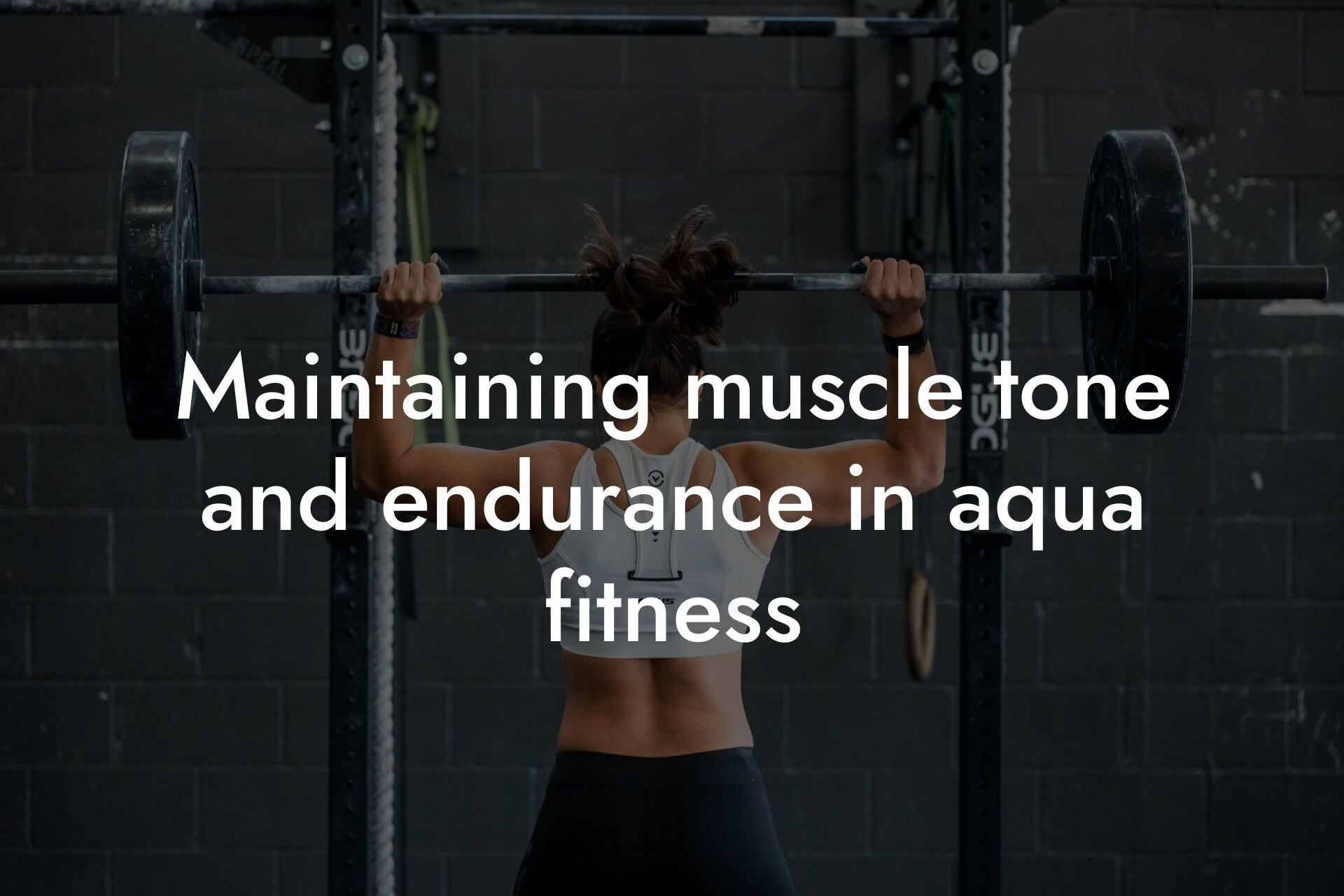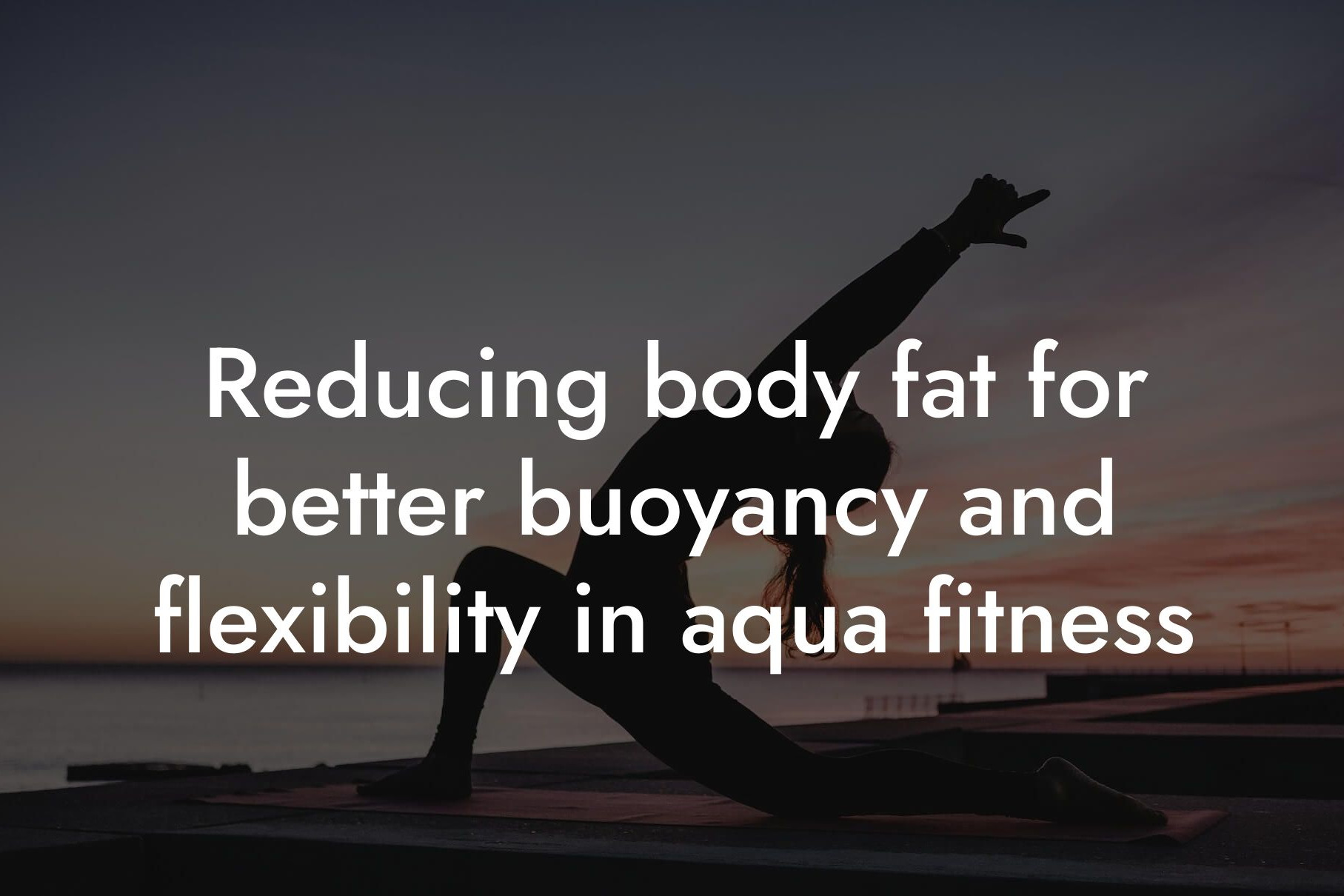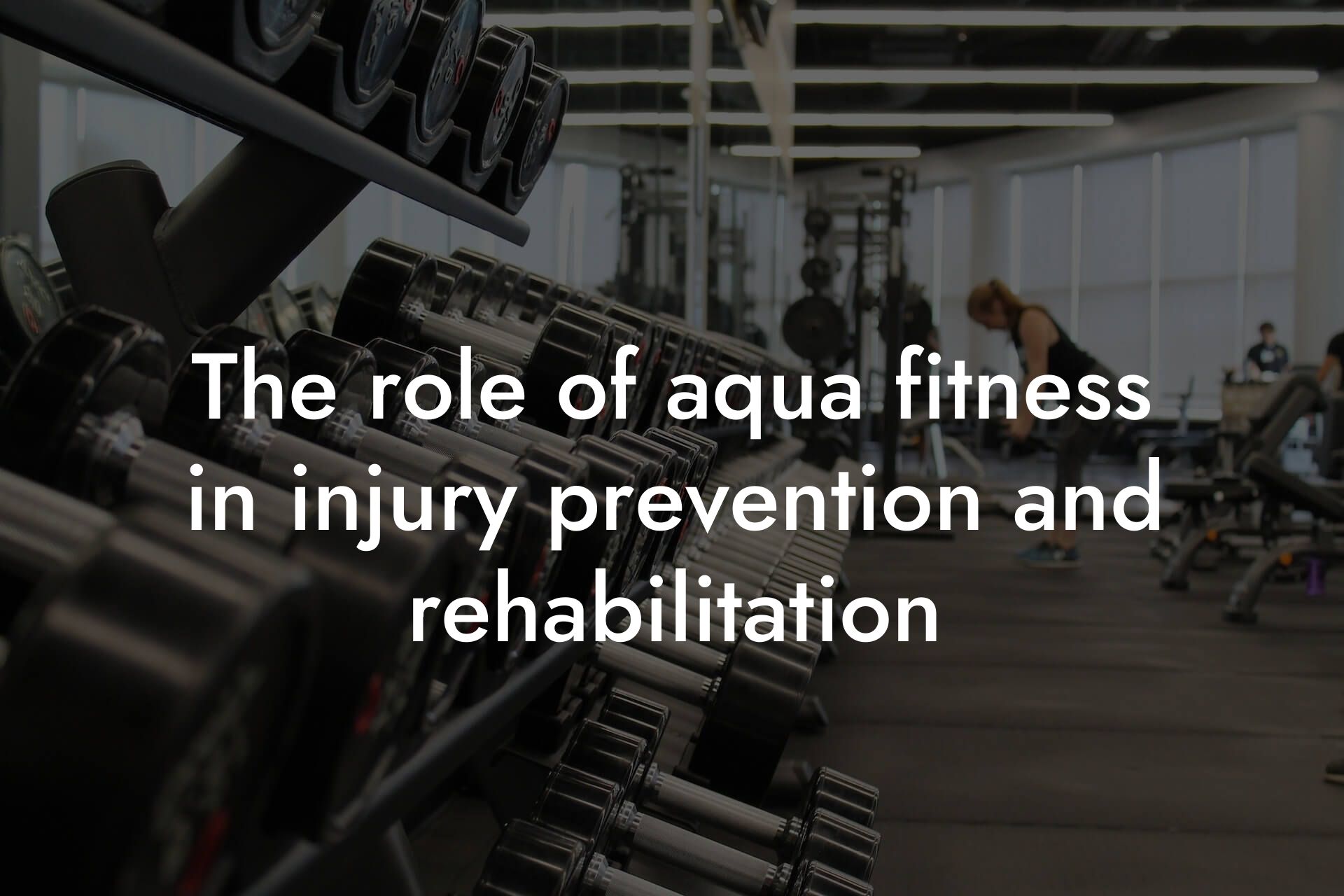As a high-earning professional, you understand the importance of maintaining a healthy and fit physique. A well-balanced body not only boosts your confidence but also enhances your overall performance in both personal and professional life. Aqua fitness is an excellent way to achieve this balance, focusing on strength, flexibility, and cardiovascular health. In this article, we'll delve into the world of aqua fitness, exploring its benefits, exercises, and tips to help you achieve a harmonious balance of strength, flexibility, and cardiovascular health.
Table of Contents
- What is Aqua Fitness?
- Benefits of Aqua Fitness
- Exercises for Strength in Aqua Fitness
- Exercises for Flexibility in Aqua Fitness
- Exercises for Cardiovascular Health in Aqua Fitness
- Tips for Balancing Strength, Flexibility, and Cardiovascular Health in Aqua Fitness
- Get Started with Tano Performance Group
- Frequently Asked Questions
What is Aqua Fitness?
Aqua fitness, also known as water-based exercise or hydrotherapy, is a form of exercise that takes place in water. It involves a range of movements and exercises performed in a swimming pool or a designated aquatic environment. Aqua fitness is an excellent option for individuals who want to improve their overall fitness, reduce stress, or rehabilitate from injuries. The buoyancy of water reduces the impact on joints, making it an ideal choice for people with joint problems or those who are recovering from injuries.
Benefits of Aqua Fitness
Aqua fitness offers numerous benefits, including:
• Low-Impact Exercise: Water-based exercises are gentle on joints, making it an excellent option for people with joint problems or those who are recovering from injuries.
• Improved Cardiovascular Health: Aqua fitness exercises help improve cardiovascular health by increasing heart rate and blood flow.
• Increased Strength and Flexibility: Water resistance helps build strength and flexibility, especially in the upper body.
• Weight Management: Aqua fitness can help with weight loss and management, as it burns calories and builds muscle mass.
• Stress Relief: The buoyancy of water and the relaxing atmosphere of the pool can help reduce stress and anxiety.
Exercises for Strength in Aqua Fitness
To improve strength in aqua fitness, focus on exercises that work multiple muscle groups at once. Some effective exercises include:
• Water Push-Ups: Stand in the pool with your feet shoulder-width apart and your hands on the pool floor. Lower your body until your chest almost touches the water, then push back up to the starting position.
• Leg Lifts: Hold onto the side of the pool and lift one leg out of the water, keeping it straight. Lower your leg back down without touching the floor, then repeat with the other leg.
• Water Resistance Band Exercises: Use water resistance bands to perform exercises like bicep curls, tricep extensions, and shoulder presses.
Exercises for Flexibility in Aqua Fitness
To improve flexibility in aqua fitness, focus on exercises that stretch and lengthen your muscles. Some effective exercises include:
• Water Walking Lunges: Walk forward in the pool, taking large strides and keeping your back straight. As you step forward, lower your body down into a lunge, keeping your front knee bent at a 90-degree angle.
• Leg Swings: Hold onto the side of the pool and swing one leg forward and backward, then switch to the other leg.
• Arm Circles: Hold your arms straight out to the sides and make small circles with your hands. Gradually increase the size of the circles as you continue.
Exercises for Cardiovascular Health in Aqua Fitness
To improve cardiovascular health in aqua fitness, focus on exercises that increase your heart rate and blood flow. Some effective exercises include:
• Water Jogging: Jog in the pool, either in place or while moving around the perimeter of the pool.
• High Knees: Run in place in the pool, lifting your knees high up towards your chest.
• Water Aerobics: Perform aerobic exercises like jumping jacks, burpees, or mountain climbers in the pool.
Tips for Balancing Strength, Flexibility, and Cardiovascular Health in Aqua Fitness
To achieve a harmonious balance of strength, flexibility, and cardiovascular health in aqua fitness, follow these tips:
• Start Slow: Begin with short sessions and gradually increase the duration and intensity as you become more comfortable.
• Warm Up and Cool Down: Always warm up before your aqua fitness session and cool down afterwards to prevent injuries and reduce muscle soreness.
• Listen to Your Body: Pay attention to your body and take regular breaks to rest and recover.
• Mix It Up: Vary your exercises and routines to avoid plateaus and prevent overuse injuries.
• Seek Professional Guidance: Consider working with a certified aqua fitness instructor or personal trainer to create a customized workout plan tailored to your needs and goals.
Balancing strength, flexibility, and cardiovascular health is essential for overall fitness and well-being. Aqua fitness is an excellent way to achieve this balance, offering a range of exercises and benefits that can be tailored to your individual needs and goals. By incorporating aqua fitness into your workout routine, you can improve your physical appearance, body fat percentage, physique, and bone density, taking your business and personal life to the next level. Remember to start slow, listen to your body, and seek professional guidance to ensure a safe and effective aqua fitness journey.
Get Started with Tano Performance Group
At Tano Performance Group, we understand the importance of achieving a balanced physique. Our state-of-the-art DEXA machine provides a comprehensive body assessment, giving you the information you need to take your fitness journey to the next level. Contact us today to schedule your appointment and start achieving your fitness goals.
Frequently Asked Questions
What is aqua fitness and how does it benefit my overall health?
Aqua fitness, also known as water-based exercise, is a form of physical activity performed in water. It offers a low-impact, yet highly effective way to improve cardiovascular health, increase strength, and enhance flexibility. The buoyancy of water reduces the impact on joints, making it an ideal exercise option for individuals with injuries or chronic pain. Additionally, aqua fitness provides an excellent full-body workout, engaging multiple muscle groups simultaneously.
How does aqua fitness improve cardiovascular health?
Aqua fitness is an excellent way to improve cardiovascular health by increasing heart rate and blood flow. The water's resistance helps to strengthen the heart and lungs, improving overall cardiovascular function. Regular aqua fitness exercises can also help lower blood pressure, reduce the risk of heart disease, and increase endurance.
What are the benefits of incorporating strength training into my aqua fitness routine?
Incorporating strength training into your aqua fitness routine can help improve muscle tone, increase bone density, and enhance overall physical function. Water-based strength exercises also help to improve joint stability and reduce the risk of injury. Additionally, building strength through aqua fitness can boost metabolism, helping with weight management and body composition.
How does flexibility play a role in aqua fitness?
Flexibility is a crucial component of aqua fitness, as it helps to improve range of motion, reduce stiffness, and enhance overall mobility. The buoyancy of water allows for greater flexibility and movement, making it an ideal environment for stretching and flexibility exercises. Regular aqua fitness exercises can also help to improve posture, reduce muscle tension, and enhance athletic performance.
What are some common aqua fitness exercises for improving strength?
Some common aqua fitness exercises for improving strength include water-based squats, lunges, leg press, arm curls, and shoulder presses. These exercises can be modified to suit individual fitness levels and goals, and can be performed using various types of equipment, such as water dumbbells or resistance bands.
How can I modify aqua fitness exercises to suit my fitness level?
Aqua fitness exercises can be modified to suit individual fitness levels by adjusting the intensity, duration, and frequency of workouts. For example, beginners can start with shorter workouts and gradually increase duration and intensity as they become more comfortable. Additionally, exercises can be modified to accommodate physical limitations or injuries, such as using flotation devices or reducing the range of motion.
What are some benefits of aqua fitness for individuals with injuries or chronic pain?
Aqua fitness offers numerous benefits for individuals with injuries or chronic pain, including reduced impact on joints, improved flexibility, and enhanced strength. The buoyancy of water also helps to reduce pain and inflammation, making it an ideal exercise option for individuals with conditions such as arthritis, fibromyalgia, or lower back pain.
Can aqua fitness help with weight loss and body composition?
Yes, aqua fitness can be an effective way to aid in weight loss and improve body composition. The combination of cardiovascular exercise, strength training, and flexibility exercises can help increase metabolism, build muscle mass, and enhance overall physical function. Regular aqua fitness exercises can also help improve insulin sensitivity, reduce inflammation, and boost overall health.
How often should I participate in aqua fitness exercises to see results?
The frequency of aqua fitness exercises depends on individual goals and fitness levels. For general health and wellness, the American Heart Association recommends at least 150 minutes of moderate-intensity aerobic exercise per week, which can be achieved through 2-3 aqua fitness sessions per week. For more specific goals, such as weight loss or improved athletic performance, more frequent or intense workouts may be necessary.
What is the best way to get started with aqua fitness?
The best way to get started with aqua fitness is to find a qualified instructor or program that suits your fitness level and goals. Many community centers, gyms, and studios offer aqua fitness classes, or you can work with a personal trainer to develop a customized program. It's also essential to invest in proper equipment, such as water shoes or goggles, to ensure a safe and effective workout.
How can I incorporate aqua fitness into my busy schedule?
Incorporating aqua fitness into a busy schedule can be challenging, but there are several strategies to help. Consider scheduling aqua fitness sessions during your lunch break, early morning, or evening. You can also try online aqua fitness classes or videos, which can be done from the comfort of your own home. Additionally, many gyms and studios offer flexible scheduling options, such as drop-in classes or private sessions.
What are some common mistakes to avoid in aqua fitness?
Some common mistakes to avoid in aqua fitness include not warming up properly, pushing yourself too hard, and not listening to your body. It's essential to start slowly, gradually increase intensity and duration, and take regular breaks to avoid fatigue and injury. Additionally, make sure to focus on proper form and technique to get the most out of your workout and reduce the risk of injury.
How can I track my progress in aqua fitness?
Tracking progress in aqua fitness can be done through various methods, including monitoring heart rate, tracking workout duration and intensity, and taking progress photos or measurements. You can also work with a personal trainer or instructor to set and achieve specific goals, such as increasing strength or improving flexibility.
What are some benefits of aqua fitness for bone density?
Aqua fitness offers numerous benefits for bone density, including improved strength, flexibility, and balance. The weight-bearing nature of aqua fitness exercises helps to stimulate bone growth and density, reducing the risk of osteoporosis and fractures. Regular aqua fitness exercises can also help improve posture, reduce the risk of falls, and enhance overall physical function.
Can aqua fitness help with stress relief and mental health?
Yes, aqua fitness can be an effective way to reduce stress and improve mental health. The relaxing and calming nature of water-based exercise can help to reduce anxiety and depression, improve mood, and enhance overall well-being. Additionally, the social aspect of aqua fitness classes can help to reduce feelings of loneliness and isolation, promoting a sense of community and connection.
How can I stay motivated and engaged in aqua fitness?
Staying motivated and engaged in aqua fitness can be achieved through various strategies, including setting specific goals, finding a workout buddy, and trying new exercises or classes. You can also track your progress, reward yourself for milestones achieved, and focus on the benefits and enjoyment of aqua fitness, rather than just the physical results.
What are some common aqua fitness exercises for improving flexibility?
Some common aqua fitness exercises for improving flexibility include water-based yoga, Pilates, and stretching exercises. These exercises can help to improve range of motion, reduce stiffness, and enhance overall mobility. Additionally, aqua fitness exercises can be modified to focus on specific areas of the body, such as the hips, shoulders, or hamstrings.
Can aqua fitness be modified for older adults or seniors?
Yes, aqua fitness can be modified for older adults or seniors to accommodate physical limitations or health conditions. Many aqua fitness classes and programs are specifically designed for older adults, focusing on low-impact exercises, gentle movements, and fall prevention. Additionally, aqua fitness can help to improve balance, strength, and flexibility, reducing the risk of falls and promoting overall health and well-being.
How can I incorporate aqua fitness into my existing fitness routine?
Incorporating aqua fitness into your existing fitness routine can be done by replacing one or two land-based workouts with aqua fitness sessions per week. You can also try combining aqua fitness with other forms of exercise, such as strength training or cardio, to create a well-rounded fitness program. Additionally, aqua fitness can be used as an active recovery tool, helping to reduce muscle soreness and improve overall physical function.
What are some benefits of aqua fitness for athletes or individuals with high physical demands?
Aqua fitness offers numerous benefits for athletes or individuals with high physical demands, including improved strength, flexibility, and endurance. The low-impact nature of aqua fitness exercises can help to reduce the risk of injury, improve recovery, and enhance overall physical function. Additionally, aqua fitness can be used as a cross-training tool, helping to improve performance in other sports or activities.
How can I find a qualified aqua fitness instructor or program?
Finding a qualified aqua fitness instructor or program can be done through various methods, including online research, word of mouth, or checking with local gyms or studios. Look for instructors or programs that are certified by reputable organizations, such as the Aquatic Exercise Association or the National Academy of Sports Medicine. Additionally, make sure to read reviews, ask questions, and observe a class before committing to a program.
What are some common misconceptions about aqua fitness?
Some common misconceptions about aqua fitness include the idea that it's only for older adults or individuals with injuries, or that it's not an effective way to improve cardiovascular health or strength. However, aqua fitness is a versatile and effective form of exercise that can be adapted to suit various fitness levels and goals. It's essential to educate yourself about the benefits and options of aqua fitness to get the most out of your workout.
Here are some related articles you might love...
- Maintaining muscle tone and endurance in aqua fitness
- Reducing body fat for better buoyancy and flexibility in aqua fitness
- The role of aqua fitness in injury prevention and rehabilitation
- Using DEXA scans to monitor progress in aqua fitness
- Nutrition tips for sustained energy in aqua fitness classes
- Bone density and its role in aqua fitness performance
- How body composition impacts aqua fitness performance
- Strength training tips to complement your aqua fitness routine
- Recovery techniques for aqua fitness practitioners
Zak Faulkner
Zak Faulkner is a leading authority in the realm of physical health and body composition analysis, with over 15 years of experience helping professionals optimise their fitness and well-being. As one the experts behind Tano Performance Group, Zak has dedicated his career to providing in-depth, science-backed insights that empower clients to elevate their physical performance and overall health.
With extensive knowledge of DEXA technology, Zak specializes in delivering comprehensive body assessments that offer precise data on body fat, muscle mass, bone density, and overall physique. His expertise enables individuals to make informed decisions and achieve their fitness goals with accuracy and confidence. Zak’s approach is rooted in a deep understanding of human physiology, combined with a passion for helping clients unlock their full potential through personalised strategies.
Over the years, Zak has earned a reputation for his commitment to excellence, precision, and client-focused service. His guidance is trusted by top professionals who demand the best when it comes to their health. Whether advising on fitness programs, nutritional strategies, or long-term wellness plans, Zak Faulkner’s insights are a valuable resource for anyone serious about taking their health and fitness to the next level.
At Tano Performance Group, Zak continues to lead our Content Team revolutionising how professionals approach their physical health, offering unparalleled expertise that drives real results.




